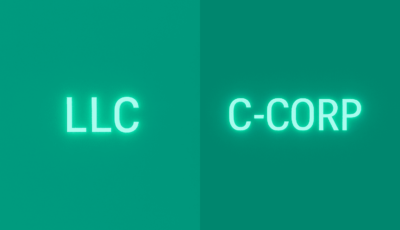Interview with Armin Kaiser, Managing Associate at LEXR and US legal expert
Expanding your startup into the US market is a major step and often full of legal uncertainties. We sat down with Armin Kaiser, Managing Associate at LEXR, to talk about the most common legal questions European founders face when entering the US market.
1. What are the most common legal questions founders ask you when planning to expand into the US?
The most frequent question is: C-Corp or LLC – what is the best legal structure for my US entity? Many founders have heard of Delaware but do not fully understand the incorporation process.
The second big topic is tax implications – for the company itself and also for the founders. Questions like “Will I become taxable in the US?” or “How do I avoid double taxation?” come up a lot. And if founders don’t bring it up, I usually do!
Find out more about our US legal services
2. Is setting up a US subsidiary always necessary?
Not necessarily. If you just want to test the market or serve a few US customers, you can do that from Europe.
But once you actively plan to sign more clients in the US, it is advisable to set up a US entity. Not just for tax reasons, it acts as a legal shield. In case of a dispute, having a US corporation allows you to keep lawsuits and liability within the US and protect your European operations. Its usually also easier to get insurance.
3. C-Corp or LLC: Which legal form fits best?
It depends on your corporate structure and tax planning.
A C-Corp is taxed separately and subject to two levels of taxation in the US: First corporate income is taxed followed by taxation of dividend payments. There are also more formalities. You need a board, corporate minutes and annual meetings. Which is also why investors prefer it.
An LLC (Limited Liability Company USA), by contrast, is a pass-through entity. It is not taxed separately, but instead included in the founder’s tax return . That can be problematic for European founders who want to avoid personal US tax exposure.
LLCs are more flexible but not always the best choice for international tax planning. A C-Corp often fits better for growth and US investor readiness.
4. What is a Delaware Flip and when does it make sense?
A Delaware Flip means swapping your ownership structure: You start with a European parent company and incorporate a Delaware subsidiary. The shareholders of the European company then exchange their shares with shares in the Delaware company. After the flip, the shareholders own shares in the Delaware company, which owns shares in the European company. The roles of parent and subsidiary are flipped.
This is mostly relevant when US investors insist on investing in a Delaware C-Corp. In that case, the flip aligns your structure with investor expectations.
But it is expensive and time-consuming. We only recommend it when there is a concrete investor or client requirement.
5. Would it make sense to start with a Delaware entity and create a European subsidiary underneath?
That can be smart if you are absolutely committed to the US market and plan to raise capital there. This structure avoids the need for a later Delaware Flip.
But you will be operating two legal entities from day one, which means double the tax filings, bookkeeping and legal costs. Unless your strategy is US-first from the beginning, it is often better to start in Europe and adapt later.
6. What should founders know about employment law in the US?
Unlike Europe, the US applies the concept of At-Will Employment, meaning that employees and employers can terminate the relationship at any time and for any or no reason – so long as the reason is not discriminatory or illegal. As an employer, its better to not state any reason.
For that reason, there are usually no employment contracts. Instead, founders use simple offer letters to outline basic terms like salary and working hours.
What is critical for tech founders: You still need a Confidentiality and Invention Assignment Agreement to ensure all IP created by employees belongs to your company. This is not an employment contract and separate from the offer letter
Many early-stage startups work with independent contractors first, before transitioning to full-time hires.
7. What legal pitfalls do founders commonly underestimate?
A big one is assuming the US subsidiary can simply act as an “extension” of the EU parent. That is a mistake. You need clear legal separation, including license agreements, intercompany contracts and proper transfer pricing.
Founders also often underestimate US operational costs, from accounting to legal and compliance. The US is more expensive than many expect – but it also offers huge opportunities.
8. What makes LEXR’s approach unique?
We are pragmatic. Our clients are startups, so we focus on what is truly needed without unnecessary complexity. Our flat-fee model helps founders stay cost-efficient while being legally protected.
Also, we deeply understand both US and European legal systems and don’t operate in legal or jurisdictional silos. That allows us to build structures that work across borders – legally and culturally.
9. Your top 3 tips for founders expanding to the US in 2025?
Understand the costs and taxes before incorporating. It is easy to set up a company in the US but costly to unwind a bad setup. Think and plan before you file.
Do not flip too early and only if required by key stakeholders. Not every investor needs a Delaware holding. Ask before you restructure.
Hire sales locally. There are differences in what works and doesn’t work in business development. Tech talent can be hired internationally, but sales staff is usually best sourced locally.
US Expansion Quick Summary:
- C-Corp is often a better fit for growth and investment, particularly for European founders, though it comes with more formalities.
- Delaware Flip only makes sense if explicitly required by investors or clients.
- Employment law is lighter in the US but IP protection is critical – always use invention assignment agreements.
- Keep US and EU entities legally and operationally separate to maintain liability protection.
- US operations can be cost-intensive. Plan for legal, tax and compliance overhead from the start.
Thinking about expanding to the US?
Book a free call with Armin Kaiser to get expert guidance on your legal structure, contracts and US market strategy.


